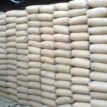FEATURED
Retailers, others list factors affecting cement prices


Dealers, particularly retailers, have blamed the N3, 400 retail price of a bag of cement in Lagos on cost of transportation and other logistics accrued after original purchase.
They made this known in separate interviews with the News Agency of Nigeria (NAN) on Thursday in Lagos.
This was as the same quantity of both Dangote and Lafarge cement were seen to be sold at a retail price of N3, 400 in a survey by NAN in Lagos.
Mr AbdulRasheed Babatunde, a cement retailer, attributed the development to the additional costs of logistics, transportation, shop rent, and labour after purchase.
Babatunde said he got a bag of cement from wholesalers at N3,100.
“The situation is like when you go to the market to buy things for sale.
“As a trader, is it the same price you bought the items from the market that you would sell it?
“You must have to factor in all your logistics to get to a price that would still be profitable to your business and at the same time, considerate of the plight of the masses.
ALSO READ: Withdraw LG scrap bill or face mass action, NULGE chides NASS
“And truthfully, I do not buy for N2, 450 or anything like that as I do not go to the plant or factories to buy.
“Doing that would mean I would sell for even higher because it means I’m travelling to get cement,” he said.
Another dealer, Mrs Anuoluwapo Obafemi, said that the gain on a bag of cement was less than N300 and the saving grace was that they sold in bulk mostly and so made tangible profit.
“There are times people buy 100 bags or up to 1,000 and so we make profit that way, else, it would have affected a lot of things.
“Price of cement has been on a steady increase over the years but we started buying at N3, 100 this year and sell for N3,400 accordingly,” she said.
Mr Devakumar Edwin, Group Executive Director, Strategy, Portfolio Development and Capital Projects, Dangote, had said that the price of a bag of cement from its factories and plants as at April 12, 2021 was N2, 450 in Obajana and Gboko and N2, 510 in Ibese, Nigeria.
Dr Muda Yusuf, Director-General, Lagos Chamber of Commerce and Industry (LCCI), said there was the need to examine the key variables driving prices in order to draw appropriate conclusions.
“Pressure on prices could result from production or output shortfalls, demand surge, monopolistic practices, elevated transportation and logistics costs, profiteering by distributors, wholesalers and retailers; currency depreciation, general inflationary pressures, among others.
READ ALSO: Minister gives reasons for nationwide power outage
“It is thus important to investigate these possibilities when we discuss the phenomenon of price increases. Such insights would define the solution that could be proffered.
“But price controls or price fixing is not an option. Price controls create needless dislocations in the economy,” he said.
The Federal Competition and Consumer Protection Commission (FCCPC), said it was keenly interested in ensuring robust and fair competition in Nigeria in a manner that redounds to the benefit of consumers and engenders fair pricing of products.
On happenings in other climes, Mr Babatunde Irukera, Executive Vice Chairman, FCCPC, noted that global principle of corporate separateness ensured that the default assumption of the regulator was not to conclude that conduct by a multinational in one market was necessarily the same in another market.
He, however, stated that were exceptions to this principle such as when an organization (or group) acts as a Single Economic Entity (SEE) or when there is evidence that, even as different undertakings, there was active coordination, supervision or collaboration with respect to implicated conduct.
“The Commission is aware of regulatory outcomes in Zambia with respect to the cement industry.
“The Commission also understands the robust public interest in this matter, more particularly because, and considering that key players in the Zambian market are also players in the Nigerian market.
“The Commission is however careful to note that regulatory outcomes in other markets do not necessarily confirm violation of law in a different market.
“This is an important distinction to promote confidence in our market and in clarity and stability of the regulatory framework and regime.
“Having said that, the Commission recognises the context and complexities involved in this particular instance, and how the body of evidence its Zambian counterpart gathered can be helpful and potentially indicative in an assessment and or inquiry into market structure and conduct in Nigeria.
“To that extent, the Commission is engaging diverse and multiple relevant stakeholders including the Zambian authorities in guiding its course of action and or any required intervention in the industry where applicable,” he said.
(NAN)
The post Retailers, others list factors affecting cement prices appeared first on Vanguard News.
[ad_2]
Source link


